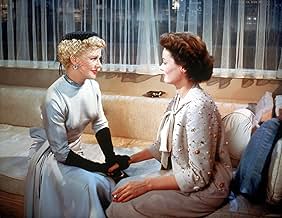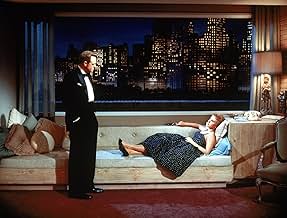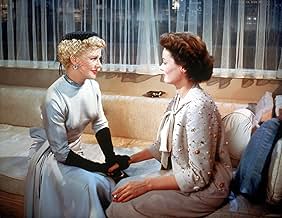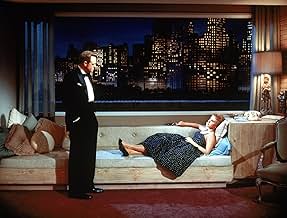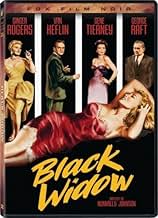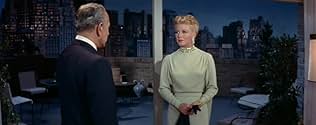IMDb RATING
6.7/10
3.5K
YOUR RATING
An aspiring young writer insinuates herself into the life of a Broadway producer only to meet an unexpected fate.An aspiring young writer insinuates herself into the life of a Broadway producer only to meet an unexpected fate.An aspiring young writer insinuates herself into the life of a Broadway producer only to meet an unexpected fate.
- Director
- Writers
- Stars
Mabel Albertson
- Sylvia
- (uncredited)
Edward Astran
- Party Guest
- (uncredited)
Bea Benaderet
- Mrs. Franklin Walsh
- (uncredited)
Mary Benoit
- Party Guest
- (uncredited)
Nesdon Booth
- Police A.P.B. Man
- (uncredited)
Paul Bradley
- Party Guest
- (uncredited)
Steve Carruthers
- Party Guest
- (uncredited)
- Director
- Writers
- All cast & crew
- Production, box office & more at IMDbPro
Featured reviews
No matter how pretentious the cocktail party, never escape by asking another wallflower out for dinner. That was theatrical producer Van Heflin's mistake when, on the terrace of Broadway diva Ginger Rogers' apartment, he took pity on hopeful young writer Peggy Ann Garner. Just a few months later, she was found hanged in the bathroom of his apartment.
It was all very innocent, though. While his wife, another star on the Rialto (Gene Tierney), was away tending to her ailing mother, Heflin let Garner use his place as a daytime office so she could write in quiet comfort. (Well, not so quiet: She listens to `The Dance of the Seven Veils' from Salome incessantly and fixates on a line from the opera: `The mystery of love is stronger than the mystery of death.') But when it turns out not only that she was pregnant but that she was murdered, the police sensibly enough find in Heflin their prime suspect.
Black Widow, written and directed by Nunnally Johnson, assembles an impressive array of Hollywood luminaries across whose resumés long shadows were beginning to creep. Along with Rogers, Tierney and Heflin, there's George Raft as a police detective, Otto Krueger as Garner's actor uncle and Reginald Gardiner as Rogers' whipped spouse. It's an ensemble-cast, 40s-high-style mystery movie, made about a decade too late but not too much the worse for that (even allowing for its color and Cinemascope).
Heflin's technically the center of the movie the patsy racing around to prove his innocence. But the meatier parts go to the women, except for Tierney, all but wasted in the recessive role of the elegant but dutiful wife. Garner makes her abrupt exit early in the movie, but returns in startlingly revisionist flashbacks. And, as the grande dame (named `Carlotta,' perhaps in homage to another grande dame of the stage, Marie Dressler's Carlotta Vance in Dinner at Eight?), Rogers strides around in big-ticket outfits and fakes a highfalutin drama-queen accent. For most of the movie it seems like ill-fitting role for the essentially proletarian Rogers, but it's shrewdly written, and near the end she shows her true colors, becoming, briefly, sensational.
Like Repeat Performance and All About Eve, Black Widow uncoils in a high-strung, back-stabbing theatrical milieu that's now all but vanished all the money and the glamour have moved west. (Not to put too fine a point on it, but the tiny part of a struggling Greenwich Village actor is taken by television producer Aaron Spelling, now one of the richest men in Hollywood.) The movie cheats a little by withholding information essential to our reading of the characters, but it's a forgivable feint; the characters are all `types' anyhow. There is, however, one baffling omission there's not a single widow in the plot.
It was all very innocent, though. While his wife, another star on the Rialto (Gene Tierney), was away tending to her ailing mother, Heflin let Garner use his place as a daytime office so she could write in quiet comfort. (Well, not so quiet: She listens to `The Dance of the Seven Veils' from Salome incessantly and fixates on a line from the opera: `The mystery of love is stronger than the mystery of death.') But when it turns out not only that she was pregnant but that she was murdered, the police sensibly enough find in Heflin their prime suspect.
Black Widow, written and directed by Nunnally Johnson, assembles an impressive array of Hollywood luminaries across whose resumés long shadows were beginning to creep. Along with Rogers, Tierney and Heflin, there's George Raft as a police detective, Otto Krueger as Garner's actor uncle and Reginald Gardiner as Rogers' whipped spouse. It's an ensemble-cast, 40s-high-style mystery movie, made about a decade too late but not too much the worse for that (even allowing for its color and Cinemascope).
Heflin's technically the center of the movie the patsy racing around to prove his innocence. But the meatier parts go to the women, except for Tierney, all but wasted in the recessive role of the elegant but dutiful wife. Garner makes her abrupt exit early in the movie, but returns in startlingly revisionist flashbacks. And, as the grande dame (named `Carlotta,' perhaps in homage to another grande dame of the stage, Marie Dressler's Carlotta Vance in Dinner at Eight?), Rogers strides around in big-ticket outfits and fakes a highfalutin drama-queen accent. For most of the movie it seems like ill-fitting role for the essentially proletarian Rogers, but it's shrewdly written, and near the end she shows her true colors, becoming, briefly, sensational.
Like Repeat Performance and All About Eve, Black Widow uncoils in a high-strung, back-stabbing theatrical milieu that's now all but vanished all the money and the glamour have moved west. (Not to put too fine a point on it, but the tiny part of a struggling Greenwich Village actor is taken by television producer Aaron Spelling, now one of the richest men in Hollywood.) The movie cheats a little by withholding information essential to our reading of the characters, but it's a forgivable feint; the characters are all `types' anyhow. There is, however, one baffling omission there's not a single widow in the plot.
Van Heflin is a theatrical producer who's suspected of murder in "Black Widow," a 1954 20th Century Fox Technicolor film directed by Nunnally Johnson. The film is set in New York among the sophisticated Broadway set, and the cast is full of familiar faces: Ginger Rogers, Gene Tierney, George Raft, Reginald Gardiner, Peggy Ann Garner, Virginia Leith, Otto Kruger, Mabel Albertson, and even Aaron Spelling.
Garner plays a young writer who, new to New York, keeps making increasingly important friends until she winds up an apparent suicide in the apartment of producer Peter Denver and his beautiful actress wife, Lottie. Soon, however, it's revealed that she was murdered, and Heflin is the prime suspect. During his own investigation as he tries to keep George Raft from putting him in prison, he learns that the sweet young thing may have been young, but she wasn't sweet.
Though a little slow at times, this is a highly entertaining film with its shots of New York and panoramic views from luxury apartments. The acting is wonderful. Ginger Rogers is great as the glamorous, acid-tongued Iris, a well-known actress with a ne'er do well husband, played effectively by Gardiner. Gene Tierney looks lovely but has a supporting role in this as Heflin's wife. The film sports two former child actors: Peggy Ann Garner as the murder victim and Skip Homeier as one of her love interests. Newcomer Virginia Leith is Homeier's sister and Garner's confidante. Garner looks appropriately innocent.
The looping in this film is very obvious for some reason - at least on television, some of the sound was fuzzy and then boom! the dubbing would come in. A very minor point. The mystery is intriguing, the glamor high, the dialogue sharp - an engrossing way to spend one's time.
Garner plays a young writer who, new to New York, keeps making increasingly important friends until she winds up an apparent suicide in the apartment of producer Peter Denver and his beautiful actress wife, Lottie. Soon, however, it's revealed that she was murdered, and Heflin is the prime suspect. During his own investigation as he tries to keep George Raft from putting him in prison, he learns that the sweet young thing may have been young, but she wasn't sweet.
Though a little slow at times, this is a highly entertaining film with its shots of New York and panoramic views from luxury apartments. The acting is wonderful. Ginger Rogers is great as the glamorous, acid-tongued Iris, a well-known actress with a ne'er do well husband, played effectively by Gardiner. Gene Tierney looks lovely but has a supporting role in this as Heflin's wife. The film sports two former child actors: Peggy Ann Garner as the murder victim and Skip Homeier as one of her love interests. Newcomer Virginia Leith is Homeier's sister and Garner's confidante. Garner looks appropriately innocent.
The looping in this film is very obvious for some reason - at least on television, some of the sound was fuzzy and then boom! the dubbing would come in. A very minor point. The mystery is intriguing, the glamor high, the dialogue sharp - an engrossing way to spend one's time.
Very impressive cast in a better than OK murder mystery. With touches of All About Eve and Sunset Boulevard, this film moves along at a good clip with only a few draggy scenes.
Ginger Rogers plays a bitchy stage diva who is married to a mousy man (Reginald Gardiner) and lives in the same apartment building as her producer (Van Heflin) who is also married to an actress (Gene Tierney). While Tierney is away, Heflin attends one of Rogers' big parties and meets a quiet young woman (Peggy Ann Garner) who actually has no real interest in acting or theatre. She is a writer. He invites her out for a real meal and she insinuates herself into his life.
The party scene is pretty funny with Ginger ripping off several "Margo Channing" ripostes at the expense of Bea Benaderet. Heflin is infatuated with the serious young Garner whose only link to the stage is her uncle (Otto Kruger) who is an actor. She also befriends a young brother and sister from Boston (Virginia Leith & Skip Homeier) who are doing the Greenwicj Village beatnik thing.
Well there is an apparent suicide and that brings in a detective (George Raft) who hounds everyone. When the suicide is discovered to be a murder, things get really dicey for all involved.
For the most part the acting is solid. I never liked Heflin but he's OK in this film. Rogers plays the diva well and looks great. Tierney gets a few good scenes. Raft is solid as the detective. Gardiner is especially good, but Peggy Ann Garner, a top child star of the 40s is quite excellent as the moody and strange young writer. Oddly, she didn't make a film after this one for another 12 years. She reminds me here of Barbara Bel Geddes. Bea Benaderet as the party guest, Otto Kruger as the uncle, and Leith and Homeier as the beatniks are all good.
Also in this film are Cathleen Nesbitt oddly cast as a cleaning lady, Mabel Albertson is the bar owner, Hilda Simms plays the sympathetic waitress, and believe it or not, the gangly witness from the movie theater is Aaron Spelling, who would have a major career as a TV producer.
Worth a watch.
Ginger Rogers plays a bitchy stage diva who is married to a mousy man (Reginald Gardiner) and lives in the same apartment building as her producer (Van Heflin) who is also married to an actress (Gene Tierney). While Tierney is away, Heflin attends one of Rogers' big parties and meets a quiet young woman (Peggy Ann Garner) who actually has no real interest in acting or theatre. She is a writer. He invites her out for a real meal and she insinuates herself into his life.
The party scene is pretty funny with Ginger ripping off several "Margo Channing" ripostes at the expense of Bea Benaderet. Heflin is infatuated with the serious young Garner whose only link to the stage is her uncle (Otto Kruger) who is an actor. She also befriends a young brother and sister from Boston (Virginia Leith & Skip Homeier) who are doing the Greenwicj Village beatnik thing.
Well there is an apparent suicide and that brings in a detective (George Raft) who hounds everyone. When the suicide is discovered to be a murder, things get really dicey for all involved.
For the most part the acting is solid. I never liked Heflin but he's OK in this film. Rogers plays the diva well and looks great. Tierney gets a few good scenes. Raft is solid as the detective. Gardiner is especially good, but Peggy Ann Garner, a top child star of the 40s is quite excellent as the moody and strange young writer. Oddly, she didn't make a film after this one for another 12 years. She reminds me here of Barbara Bel Geddes. Bea Benaderet as the party guest, Otto Kruger as the uncle, and Leith and Homeier as the beatniks are all good.
Also in this film are Cathleen Nesbitt oddly cast as a cleaning lady, Mabel Albertson is the bar owner, Hilda Simms plays the sympathetic waitress, and believe it or not, the gangly witness from the movie theater is Aaron Spelling, who would have a major career as a TV producer.
Worth a watch.
"Black Widow" is a well-written, though old-style, entertaining mystery. The story is taken from a novel by Patrick Quentin, a sound mystery-writer.
However the essence of the movie lies in the magnificent cinemascope photography, colors and visual effects. Note that most scenes have in the background large windows or terraces wide-open on the spectacular, terrific New York sceneries. Even the furniture of the various apartments is carefully chosen and placed, with beautiful artistic effects. Outstanding is the brief scene inside the dark bar, with the costumers merged into a liquid light: an evident reminiscence of Edward Hopper's paintings.
Alas! All these visual beauties are seriously damaged, if not destroyed, by the TV version, which essentially shows just half of the screen.
The performances by all interpreters are generally good and professional. A major (personal) disappointment is that Gene Tierney does nothing. She's not even in the list of suspects, since she was thousands of miles away from New York during the whole murder affair. She just sits silently on the background, adding her incomparable beauty and natural refinement to the magnificent New York views. It should be added that George Raft seems completely out-of-role... but I'm too fond of this guy to be able to criticize him.
"Black Widow" is a good film; hopefully someone will be able to see it on the wide screen.
However the essence of the movie lies in the magnificent cinemascope photography, colors and visual effects. Note that most scenes have in the background large windows or terraces wide-open on the spectacular, terrific New York sceneries. Even the furniture of the various apartments is carefully chosen and placed, with beautiful artistic effects. Outstanding is the brief scene inside the dark bar, with the costumers merged into a liquid light: an evident reminiscence of Edward Hopper's paintings.
Alas! All these visual beauties are seriously damaged, if not destroyed, by the TV version, which essentially shows just half of the screen.
The performances by all interpreters are generally good and professional. A major (personal) disappointment is that Gene Tierney does nothing. She's not even in the list of suspects, since she was thousands of miles away from New York during the whole murder affair. She just sits silently on the background, adding her incomparable beauty and natural refinement to the magnificent New York views. It should be added that George Raft seems completely out-of-role... but I'm too fond of this guy to be able to criticize him.
"Black Widow" is a good film; hopefully someone will be able to see it on the wide screen.
Five years earlier, this drawingroom drama would have been filmed in small screen b&w. But the year is 1954 and film audiences are staying home with their new-fangled little black boxes. So a big budget studio like TCF takes what amounts to an "Ellery Queen in Manhattan" plot, gussies it up in lavish color, stretches the screen to Cinemascope length, loads up the marquee with big names, and sends the result out to compete with Lucille Ball and Milton Berle. I don't know how well the strategy succeeded commercially, but I enjoyed the movie then and still do.
As a whodunit, the mystery's only partially successful—not enough suspects and too convoluted to follow. At the same time, the pacing sometimes sags in ways that undercut the suspense. Still, the 95 minutes does add up to a gorgeous tapestry, thanks to expert art direction, set decoration, and a well-upholstered cast. And who could hold together a sometimes-confusing storyline better than the always-reliable Van Heflin. Also, I expect urbane writer-director Nunnally Johnson fit comfortably with the sophisticated Manhattan setting and show-biz personalities. So, it's not surprising that he gets off some insider innuendo. Catch the cocktail party shot at gossip columnist Hedda Hopper, known for her bizarre headgear; I expect Johnson was settling an old score there. Then too, having the ingénue (Garner) turn up mysteriously pregnant is rather daring for the straitjacketed Production Code period. Also, watch for the skinny young actor (Oliver) interviewed by Heflin near film's end. That's future TV mogul Aaron Spelling getting a proverbial foot in the door.
Anyway, the film provides an entertaining glimpse of drawingroom drama getting a face-lift during the early years of the television challenge.
As a whodunit, the mystery's only partially successful—not enough suspects and too convoluted to follow. At the same time, the pacing sometimes sags in ways that undercut the suspense. Still, the 95 minutes does add up to a gorgeous tapestry, thanks to expert art direction, set decoration, and a well-upholstered cast. And who could hold together a sometimes-confusing storyline better than the always-reliable Van Heflin. Also, I expect urbane writer-director Nunnally Johnson fit comfortably with the sophisticated Manhattan setting and show-biz personalities. So, it's not surprising that he gets off some insider innuendo. Catch the cocktail party shot at gossip columnist Hedda Hopper, known for her bizarre headgear; I expect Johnson was settling an old score there. Then too, having the ingénue (Garner) turn up mysteriously pregnant is rather daring for the straitjacketed Production Code period. Also, watch for the skinny young actor (Oliver) interviewed by Heflin near film's end. That's future TV mogul Aaron Spelling getting a proverbial foot in the door.
Anyway, the film provides an entertaining glimpse of drawingroom drama getting a face-lift during the early years of the television challenge.
Did you know
- TriviaNunnally Johnson originally offered the role played by Ginger Rogers to Tallulah Bankhead, who called the writer-producer and, in a 25-minute phone conversation, gave him her reasons for rejecting the role. Rogers turned the part down as well, but had a change of heart after Johnson sent her a letter asking her to reconsider, on the proviso that she could take the relatively minor role and make it into a star-turn.
- GoofsWhen the suicide note is discovered by the Denvers, it is lying, uncreased, on the table. Later, during questioning, the detective produces it, folded up, from his pocket. A cop would never mishandle and mutilate evidence that way.
- Quotes
[opening narration]
Peter Denver: The Black Widow, deadliest of all spiders, earned its dark title through its deplorable practice of devouring its mate.
- Crazy creditsOpening credits are shown over the background of a spider web made by a black widow.
- ConnectionsFeatured in Ginger Rogers at Twentieth Century Fox (2007)
- SoundtracksTheme from 'Dance of the Seven Veils'
from "Salome"
by Richard Strauss
[Played occasionally throughout the picture]
- How long is Black Widow?Powered by Alexa
Details
- Release date
- Country of origin
- Language
- Also known as
- La viuda negra
- Filming locations
- 1515 Broadway, Manhattan, New York City, New York, USA(Hotel Astor exterior near Times Square)
- Production company
- See more company credits at IMDbPro
Box office
- Budget
- $1,095,000 (estimated)
- Runtime
- 1h 35m(95 min)
- Color
- Aspect ratio
- 2.55 : 1
Contribute to this page
Suggest an edit or add missing content


